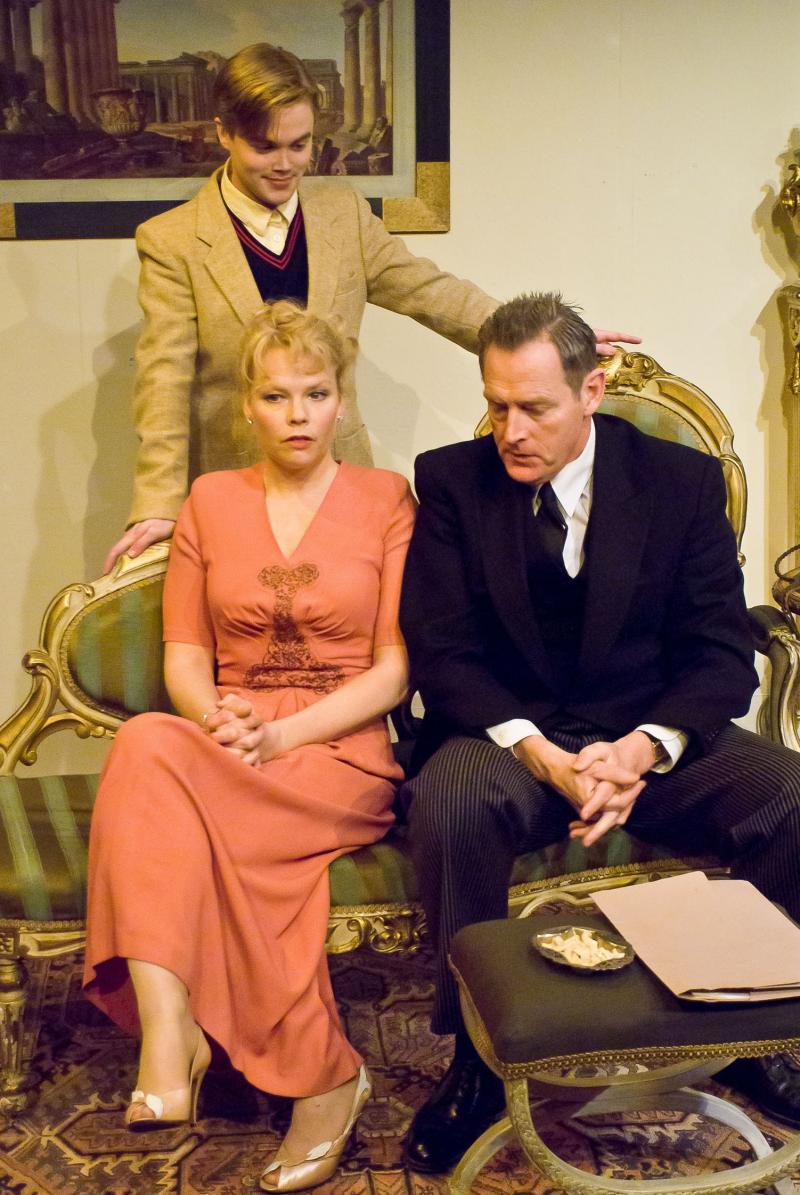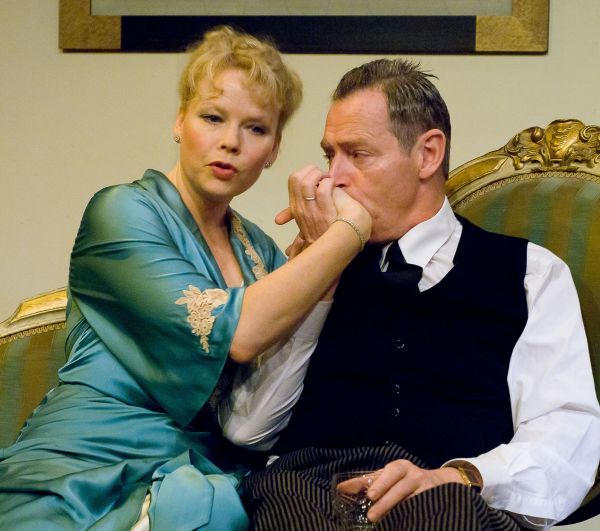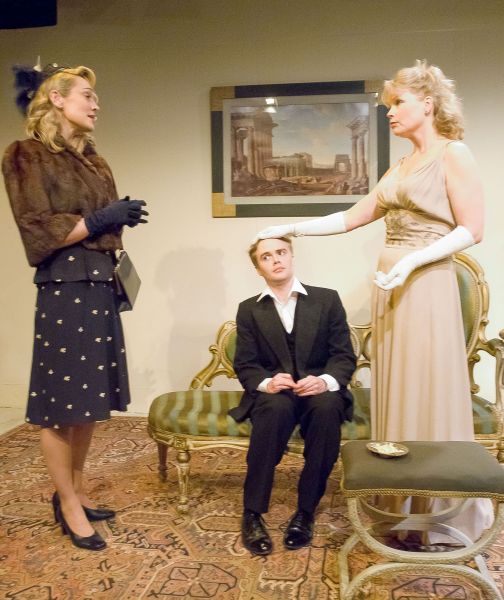Less Than Kind, Jermyn Street Theatre | reviews, news & interviews
Less Than Kind, Jermyn Street Theatre
Less Than Kind, Jermyn Street Theatre
A worthy and unusual start to a year of Rattigan celebrations

“There’s no situation in the world that can’t be passed off with small talk,” claims hostess extraordinaire Olivia Brown in Terence Rattigan’s Less Than Kind. It’s a maxim that could well serve as Rattigan’s theatrical epitaph, the philosophy that allows him to smuggle desperation, frustration and steel-capped social critique in amongst the silk peignoirs and smoking jackets of his drama.
Originally conceived as a contemporary reworking of Hamlet and vehicle for Gertrude Lawrence, Rattigan’s Less Than Kind was to arrive on stage as brittle social comedy Love in Idleness. German bombing raids, Rattigan’s own insecurity and the velvet-gloved influence of Broadway husband and wife stars Alfred Lunt and Lynn Fontanne all conspired to create an entirely new drama under whose parasitic weight the original play disappeared completely. Resurrected from the sole surviving playtext, this production represents the first staging of Rattigan’s initial creation.
Treading familiar wartime ground, Less Than Kind transposes the opening Hamlet scenario into the England of 1944. Seventeen-year-old Michael Brown (David Osmond) returns home after a five-year absence only to find his mother (Sara Crowe) living in sin with married cabinet minister Sir John Fletcher (Michael Simkins). Forcing his mother to choose between her son and lover, Michael must confront not only Sir John himself but also the seductive capitalist values he represents.
 To reframe Hamlet as a comedy (however serious) is a dangerous undertaking, and one not entirely successful in Rattigan’s hands. The premise itself adapts surprisingly well, and the conflict between the young and pink moral opprobrium of Michael and the worldly parrying of Sir John makes for an unusual take on father-son tensions. The problem comes with the more literal source references – the proposed theatre outing, Michael’s demonstrative wearing of a black cravat – all of which serve only to push the audience back beyond the play’s artful frame, effortful meta-theatre that the elegant structure simply doesn’t need.
To reframe Hamlet as a comedy (however serious) is a dangerous undertaking, and one not entirely successful in Rattigan’s hands. The premise itself adapts surprisingly well, and the conflict between the young and pink moral opprobrium of Michael and the worldly parrying of Sir John makes for an unusual take on father-son tensions. The problem comes with the more literal source references – the proposed theatre outing, Michael’s demonstrative wearing of a black cravat – all of which serve only to push the audience back beyond the play’s artful frame, effortful meta-theatre that the elegant structure simply doesn’t need.
Long before Pinter had his pauses, Rattigan was there with his lack of pause – the flow of fluent, meaningless chatter that conceals every bit as loaded a subtext. Leading the way through some of the author’s more felicitous meanderings is Sara Crowe’s Olivia (pictured above with Michael Simkins as Sir John). A hostess of Machiavellian skill, her neat social manipulations are balanced by both a moral and maternal sense of duty that rounds out a potentially disposable, Wildean figure. Scattily affectionate – a tragic heroine waiting to happen – Crowe’s Olivia provides the emotional platform for the drama, the stable point from which the excesses and exaggerations of Michael and Sir John (as well as Sir John’s vacuously decorative wife Diana) may deviate.
 All bland stare and smooth cheek, David Osmond’s Michael (pictured left with Crowe and Caroline Head as Diana) is a terrifying Haneke-style creature. With a conscience as clear as his very pale skin, he expounds his beloved socialist doctrines, moving between petulant outburst and controlled menace fluently, lacking perhaps just a little of the implied vulnerability. Physically well matched in the tall and handsomely grizzled Simkins, the battle is deftly handled and the reconciliation even more so. Support from a terribly smooth Caroline Head as Diana and Katie Evans as requisite domestic Polton round out proceedings.
All bland stare and smooth cheek, David Osmond’s Michael (pictured left with Crowe and Caroline Head as Diana) is a terrifying Haneke-style creature. With a conscience as clear as his very pale skin, he expounds his beloved socialist doctrines, moving between petulant outburst and controlled menace fluently, lacking perhaps just a little of the implied vulnerability. Physically well matched in the tall and handsomely grizzled Simkins, the battle is deftly handled and the reconciliation even more so. Support from a terribly smooth Caroline Head as Diana and Katie Evans as requisite domestic Polton round out proceedings.
The tight space of the Jermyn Street Theatre comes into its own in this production, the enforced intimacy doing away with some of the stagy, nostalgic qualities that can blight Rattigan. Performances instinctively become less projected, action less emphatic, and the result is an uncharacteristically natural comedy. A real find, this archive treasure is well served by director Adrian Brown’s delicate handling, and launches this centenary year in worthy style.
Explore topics
Share this article
Add comment
The future of Arts Journalism
You can stop theartsdesk.com closing!
We urgently need financing to survive. Our fundraising drive has thus far raised £49,000 but we need to reach £100,000 or we will be forced to close. Please contribute here: https://gofund.me/c3f6033d
And if you can forward this information to anyone who might assist, we’d be grateful.

Subscribe to theartsdesk.com
Thank you for continuing to read our work on theartsdesk.com. For unlimited access to every article in its entirety, including our archive of more than 15,000 pieces, we're asking for £5 per month or £40 per year. We feel it's a very good deal, and hope you do too.
To take a subscription now simply click here.
And if you're looking for that extra gift for a friend or family member, why not treat them to a theartsdesk.com gift subscription?
more Theatre
 Macbeth, RSC, Stratford review - Glaswegian gangs and ghoulies prove gripping
Sam Heughan's Macbeth cannot quite find a home in a mobster pub
Macbeth, RSC, Stratford review - Glaswegian gangs and ghoulies prove gripping
Sam Heughan's Macbeth cannot quite find a home in a mobster pub
 The Line of Beauty, Almeida Theatre review - the 80s revisited in theatrically ravishing form
Alan Hollinghurst novel is cunningly filleted, very finely acted
The Line of Beauty, Almeida Theatre review - the 80s revisited in theatrically ravishing form
Alan Hollinghurst novel is cunningly filleted, very finely acted
 Wendy & Peter Pan, Barbican Theatre review - mixed bag of panto and comic play, turned up to 11
The RSC adaptation is aimed at children, though all will thrill to its spectacle
Wendy & Peter Pan, Barbican Theatre review - mixed bag of panto and comic play, turned up to 11
The RSC adaptation is aimed at children, though all will thrill to its spectacle
 Hedda, Orange Tree Theatre review - a monument reimagined, perhaps even improved
Scandinavian masterpiece transplanted into a London reeling from the ravages of war
Hedda, Orange Tree Theatre review - a monument reimagined, perhaps even improved
Scandinavian masterpiece transplanted into a London reeling from the ravages of war
 The Assembled Parties, Hampstead review - a rarity, a well-made play delivered straight
Witty but poignant tribute to the strength of family ties as all around disintegrates
The Assembled Parties, Hampstead review - a rarity, a well-made play delivered straight
Witty but poignant tribute to the strength of family ties as all around disintegrates
 Mary Page Marlowe, Old Vic review - a starry portrait of a splintered life
Tracy Letts's Off Broadway play makes a shimmeringly powerful London debut
Mary Page Marlowe, Old Vic review - a starry portrait of a splintered life
Tracy Letts's Off Broadway play makes a shimmeringly powerful London debut
 Little Brother, Soho Theatre review - light, bright but emotionally true
This Verity Bargate Award-winning dramedy is entertaining as well as thought provoking
Little Brother, Soho Theatre review - light, bright but emotionally true
This Verity Bargate Award-winning dramedy is entertaining as well as thought provoking
 The Unbelievers, Royal Court Theatre - grimly compelling, powerfully performed
Nick Payne's new play is amongst his best
The Unbelievers, Royal Court Theatre - grimly compelling, powerfully performed
Nick Payne's new play is amongst his best
 The Maids, Donmar Warehouse review - vibrant cast lost in a spectacular-looking fever dream
Kip Williams revises Genet, with little gained in the update except eye-popping visuals
The Maids, Donmar Warehouse review - vibrant cast lost in a spectacular-looking fever dream
Kip Williams revises Genet, with little gained in the update except eye-popping visuals
 Ragdoll, Jermyn Street Theatre review - compelling and emotionally truthful
Katherine Moar returns with a Patty Hearst-inspired follow up to her debut hit 'Farm Hall'
Ragdoll, Jermyn Street Theatre review - compelling and emotionally truthful
Katherine Moar returns with a Patty Hearst-inspired follow up to her debut hit 'Farm Hall'
 Troilus and Cressida, Globe Theatre review - a 'problem play' with added problems
Raucous and carnivalesque, but also ugly and incomprehensible
Troilus and Cressida, Globe Theatre review - a 'problem play' with added problems
Raucous and carnivalesque, but also ugly and incomprehensible
 Clarkston, Trafalgar Theatre review - two lads on a road to nowhere
Netflix star, Joe Locke, is the selling point of a production that needs one
Clarkston, Trafalgar Theatre review - two lads on a road to nowhere
Netflix star, Joe Locke, is the selling point of a production that needs one

Comments
...
...
...